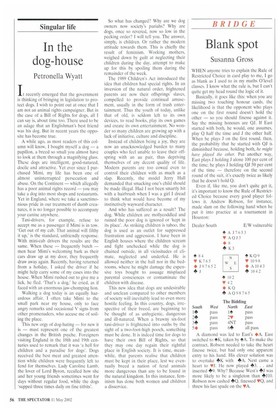In the dog-house
Petronella Wyatt
It recently emerged that the government is thinking of bringing in legislation to protect dogs. I wish to point out at once that I am not an animal rights campaigner. But in the case of a Bill of Rights for dogs, all I can say is, about time too. There used to be an adage that an Englishman's best friend was his dog. But in recent years the opposite has become true.
A while ago, as most readers of this column will know, I bought myself a dog — a papillon, a breed so small you almost have to look at them through a magnifying glass. These dogs are intelligent, good-natured, docile and attractive. Yet ever since I purchased Mimi, my life has been one of almost uninterrupted persecution and abuse. On the Continent — which allegedly has a poor animal rights record — you may take a dog into most shops and restaurants. Yet in England, where we take a sanctimonious pride in our treatment of dumb creatures, it is no longer possible to accompany your canine anywhere.
Taxi-drivers, for example, refuse to accept me as a passenger if Mimi is in tow. 'Get out of my cab. That animal will filthy it up,' is the standard, unfriendly response. With mini-cab drivers the results are the same. When these — frequently butch — men hear Mimi's welcoming bark as their cars draw up at my door, they frequently draw away again. Recently, having returned from a holiday, I asked the driver if he might help carry some of my cases into the house, When Mimi rushed out to give me a lick, he fled. 'That's a dog,' he cried, as if faced with an enormous jaw-chomping lion.
Walking a dog today is an equally hazardous affair. I often take Mimi to the small park near my house, only to face angry remarks and occasional V signs from other promenaders, who accuse me of soiling the place.
This new orgy of dog-hating — for new it is — must represent one of the greatest changes in the British psyche. Foreigners visiting England in the 18th and 19th centuries used to remark that it was 'a hell for children and a paradise for dogs'. Dogs received the best meat and greatest attention while children were frequently left to fend for themselves. Lady Caroline Lamb, the lover of Lord Byron, recalled how she and her young friends sometimes went for days without regular food, while the dogs 'supped three times daily on fine titbits'. So what has changed? Why are we dog owners now society's pariahs? Why are dogs, once so revered, now so low in the peeking order? I will tell you. The answer, simply, is children. Or rather the modern attitude towards them. This is chiefly the result of feminism, Working mothers, weighed down by guilt at neglecting their children during the day, attempt to make up for this by spoiling them during the remainder of the week.
The 1989 Children's Act introduced the idea that children had special rights. In an inversion of the natural order, frightened parents are now their offsprings' slaves, compelled to provide continual amusement, usually in the form of trash entertainment. Thus the youth of today, unlike that of old, is seldom left to its own devices, to read books, play its own games and create its own entertainment. No wonder so many children are growing up with a lack of initiative, culture and discipline.
Instead of children being a joy, they are now an unacknowledged burden to many couples who feel unable to leave their offspring with an au pair, thus depriving themselves of any decent quality of life. Modern parents are too cowed even to control their children with as much as a slap. Recently, the model Jerry Hall demanded that smacking one's child should be made illegal. Had I not been smartly hit with a hairbrush when I was a girl I dread to think what would have become of my instinctively wayward character.
And who has suffered as a result? The dog. While children are mollycoddled and ruined the poor dog is ignored or 'kept in its place.. As striking children is taboo, the dog is used as an outlet for suppressed frustration and aggression. I have been in English houses where the children scream and fight unchecked while the dog is chained outside, in all vicissitudes of climate, neglected and underfed. He is allowed neither in the hall nor in the bedrooms, where he might damage the expensive toys bought to assuage misplaced parental consciences or contaminate the children with disease.
This new idea that dogs are undesirable and unclean compared to other members of society will inevitably lead to even more hostile feeling. In this country, dogs, irrespective of their breed, are beginning to be thought of as unhygienic, dangerous and ill-natured. When a brawny six-foot taxi-driver is frightened into oaths by the sight of a two-foot-high pooch, something must be done. It is indeed time for dogs to have their own Bill of Rights, so that they may one day regain their rightful place in English society. It is time, meanwhile, that parents realise that children must be kept in their place, lest we eventually breed a nation of feral animals more dangerous than any to be found in the natural kingdom. In this instance, feminism has done both women and children a disservice.






































































 Previous page
Previous page